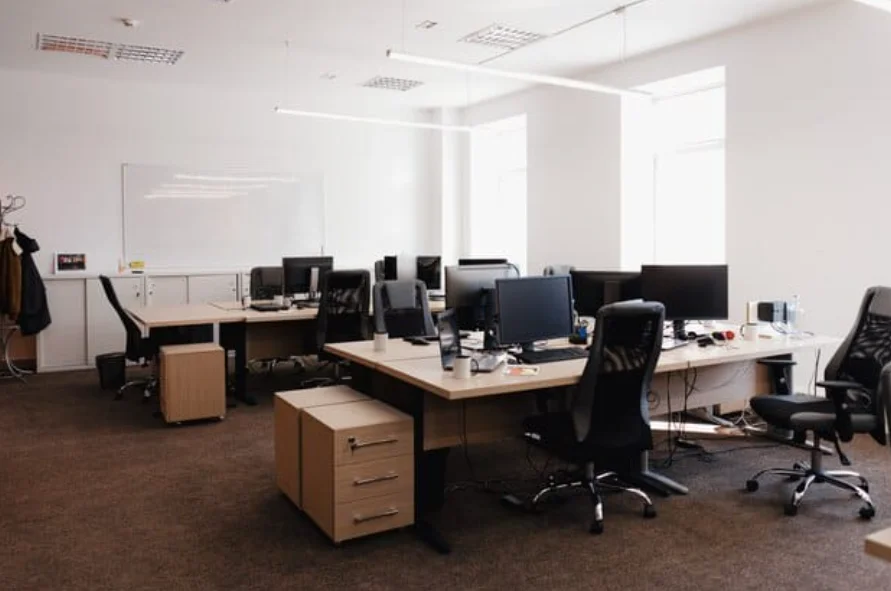
Renting office space isn’t what it used to be because traditional leases, which are long, rigid, and expensive, just don’t fit how modern teams work. Companies now want spaces that work from day one, with zero setup hassle and no big commitments, like serviced offices.
In this guide, we will explain what serviced offices offer, how they’re different from other setups, and things you should know before moving in. We will also talk about features, pricing and benefits, and discuss tips to help you figure out whether these spaces are suitable for you.
What a Serviced Office Really Means
A serviced office is a fully equipped, ready-to-use workspace that you can rent short- or long-term. It’s not just about the desks but about the entire setup being handled for you.
Think of walking into an office where the internet is already running, phones are connected, coffee’s brewing and someone’s ready to greet your guests at the front desk. There are third-party providers who manage these spaces, and they take care of everything, including cleaning, maintenance, tech support, and even mail handling.
Who Should Consider This Setup
Serviced offices suit different types of businesses. Startups love them because they don’t need to invest upfront in furniture or hardware. Remote teams use them as home bases in key cities. Even bigger companies rent them during expansions or projects.
If you’re testing a new market, working on a short-term contract, or scaling quickly, these spaces give you room to adjust without locking you into five-year leases. You are only paying for the space and services you will fully use.
What’s Included and What Isn’t
Most serviced offices cover way more than just a desk. Here’s what you’ll typically get:
- Furniture: Desks, chairs, and storage are already set up.
- Internet: Fast, business-grade connections.
- Reception staff: Someone to answer your calls and greet visitors.
- Meeting rooms: Bookable when you need a formal space.
- Admin support: Scanning, printing, and copying are all sorted.
- Kitchens: Stocked with coffee, tea, and sometimes snacks.
- IT Help: On-site tech teams, not just a helpline.
- Cleaning and maintenance: Done regularly and usually included.
You can even find extras like lounges, breakout rooms, gyms, or rooftop terraces, but note that you may have to pay extra for some of these premium features. Ask upfront what’s part of the package and what’s pay-as-you-go.
The Real Benefits You’ll Notice
Flexibility That Actually Works for You
You don’t always know what the next six months will look like. A serviced office lets you rent for just a few weeks or much longer without worrying about hefty deposits or lock-in terms. If you suddenly need more space or fewer desks, it’s usually just a quick conversation, not a complicated contract renegotiation.
Cost Clarity and Control
With serviced offices, you usually get one monthly fee that covers everything. No extra bills for electricity, cleaning, or maintenance. You don’t have to budget separately for office furniture, either. That makes it way easier to plan your expenses, especially if you’re a smaller team trying to grow smart.
Zero Time Lost on Setup
A traditional office can take months to get ready. You have to deal with furniture, Wi-Fi, painting, and a hundred other small decisions. But in a serviced office, you can sign today and start working tomorrow. That speed matters, especially if you’re dealing with tight project deadlines or sudden growth.
Built-In Services That Make Life Easier
Need a receptionist? Done. Conference call gear? It’s already there. Even things like mail sorting or office supplies are taken care of. It’s like having a whole operations team on standby but without hiring one.
An Instant Professional Image
Most serviced offices are in business hotspots, often in well-known buildings. That makes a great impression on clients and can help your team feel more motivated, too. If you’re looking for furnished offices in Mumbai, for example, you’ll likely find options in key areas that instantly boost your business image.
Comparing Serviced Offices and Coworking Spaces
One of the common features both serviced offices and coworking setups share is flexibility, but they work a bit differently.
In coworking spaces, you’ll usually be in an open-plan layout, sharing everything with other teams. It’s more social and casual so if you are a freelancer, creator, or a solo founder, this might be for you.
Serviced offices, on the other hand, give you more privacy. You can have your own room, maybe even a whole floor. Although there are still some spaces like kitchens and lounges that you will have to share, most part of your day is structured and quieter. If you need to meet clients often or make private calls, this setup will likely suit you better.
How to Pick the Right Serviced Office
Start With Location
Being close to public transport, parking, or client hubs matters more than you think. A great office far from where your team lives won’t be used much. Choose something that’s central but still practical.
Think About Your Team’s Style
Quiet zones are suitable for deep focus, and sometimes you need a collaborative environment with shared lounges and whiteboards. Which one is more suitable for you will also depend on your team’s style. The layout and design should fit your daily work habits, not just look nice in pictures.
Make a Checklist Before You Visit
List what you absolutely need, like fast Wi-Fi and private meeting rooms and what’s optional. That helps you avoid overpaying for features you’ll never use or missing out on something important like IT support.
Ask for a Trial If You Can
Many office providers let you try the space for a week or even a day. That’s the best way to see if it’s the right fit before committing. Watch how the staff handles issues, how clean the space stays, and if the vibe matches your company culture.
Conclusion
It’s clear that workspaces are becoming less about square footage and more about experience. Serviced offices reflect that shift.
In the next few years, as businesses continue to mix remote work with office days, this kind of setup will likely become even more common. Providers might start offering more customisation, better tech tools, or hybrid options tailored to teams spread across cities.
And for you, it means more choices. You can try new locations, scale your business more smoothly, and focus more on the work, not the overhead that usually comes with it.

Advancing Women's Leadership for Stronger Governance in the MENA Region

Real Time Visibility in Fleet Operations - What Does It Change?

How Smart Website Owners Save Hundreds on Hosting


